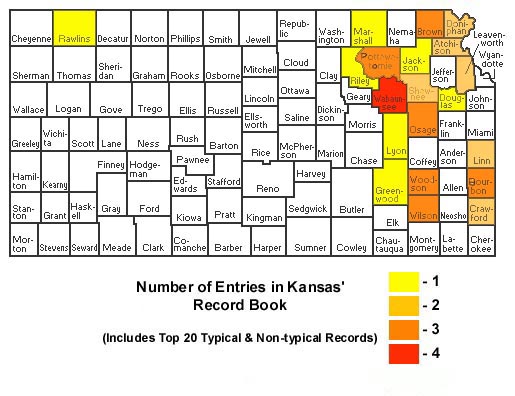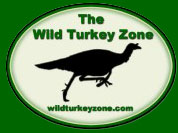| |
| Wild
Turkey Zone
--Fall Kansas Turkey Hunting |
|
The Sunflower State has been rapidly increasing
in popularity as a destination for turkey
hunting trips. Many people have asked me
for guidance on hunting trips to Kansas
so this is my attempt at answering a lot
of the questions I've been receiving.
|
| Licenses and Fees - 2005 Fall Turkey
Season Info |
|
The Kansas
Department of Wildlife and Parks has the complete
rundown on all of the regulations. The fall 2005 turkey
season info can be found at
http://www.kdwp.state.ks.us/news/hunting/turkey
and I encourage you to download and print off a copy
of the regulations if you are interested in hunting
in Kansas this fall.
Here are some of the basics
for the fall season:
|
Fall Season Dates - |
Oct 1 - Nov 29 and Dec 12 - Dec 31, 2004 and new
for 2005 is a January season, Jan 9 - 31, 2006 |
| Shooting
Hours |
1/2
Hour before Sunrise to Sunset |
| Season
Limit |
1
turkey either sex per permit
1 turkey either sex per game tag.
Any person who has purchased a Fall
Turkey Permit may purchase up to 3 Game
tags. Game tags are valid for Unit 2
only. |
| Resident
Permit Cost |
$21.00
(Available over the counter for Unit
1, 2, & 3) |
| Nonresident
Permit Cost |
$31.00 (Non-residents are eligible for
Units 1, 2 & 3) |
| Additional
Game Tag Cost |
$11.00
each ($21 for nonresidents) - valid
in Unit 2 only. (Available over
the counter) |
| Nonresident
Hunting License |
$73.25
- Must have hunting license to hunt
turkeys. (Available online) |
|
Hunter Education |
Anyone born on or after July 1, 1957
must complete an approved hunter education
course before hunting in Kansas. |
| Legal
Methods |
Turkeys
may be shot only while on the ground or in flight.
Dogs may be used while hunting turkey during the
fall season. |
| Legal
Equipment |
Shotguns
and muzzle-loading shotguns 20 ga or
larger using shot sizes 2-9; long, recurve
or compound bows. |

|
|
The Kansas Dept of Wildlife
and Parks has a list of available public
lands here.
Many of the best areas are, of course, in
the eastern third of the state which corresponds
to the highest turkey populations also.
The western half of the state does have
turkeys but is limited in habitat.
There are also Walk in Hunting
Areas for spring turkey hunting that are
open to the public. The KDWP will have the
atlas to these areas available online as
well as the policies and rules for using
these lands.
|
| Rio Grande Territory |
|
Many people
travel to Kansas in search of a Rio Grande
turkey. Kansas has Easterns, Rios and hybrid
birds across the state. Generally, Easterns
predominate in the eastern 1/3 of the state
next to Missouri. The true Rios are limited
to the south-central, south-west and north-west
parts of the state. KDWP put together a
map showing the general ranges of the different
subspecies. From what I've been recently
told about the turkey flock, your best bet
at a pure blooded Rio Grande is to get as
far south and west in the state as you can.

I do most of
my hunting in a county that contains both
Eastern and Rio/Eastern hybrid birds. I've
seen some birds that look completely like
a Rio but the majority are Easterns. What's
interesting is that even within the same
flock, there may be birds that look like
a true Eastern standing by a turkey that
looks like a Rio Grande so you never know
what you might get.
|
| Which Areas Are The Best? |
|
Like I've stated
previously the eastern one-third of the
state has the highest population of turkeys.
It also receives the most hunting pressure.
I took a look at the Kansas
Turkey Records and put together
a map of where the record book entries came
from. The counties which are shaded have
entries into the Top 20 lists on either
the Typical or Non-Typical lists or both
for Kansas. I think this shows some general
areas that obviously have some big birds.

This makes
most of Kansas look pretty barren of turkeys
which of course isn't true. There are a
couple of factors involved here: First,
there are more turkeys being taken in the
eastern counties so the odds are in favor
of more records being from there, and 2)
Eastern turkeys are generally larger than
Rios which also slants this map some. But
if you are looking to shoot some big turkeys,
you can't beat the southeast corner of the
state followed by the northeast corner.
Also, looking at the non-typical records,
the southeast corner of Kansas has a fairly
high concentration of multiple-bearded birds
for some unknown reason.
Good luck with
your trip to Kansas!!!
|
|
|
Kansas
Turkey Hunting -- Rob Ramsdale
|
|
|
|

